Blog:
JA reports: The Value of Local TV News forum goals and performance

A central part of the JA’s mission is to gather voices together online around common questions news producers share. Community needs and JA program values guide our work hosting forums. These values include a high degree of transparency and accountability to you and the growing JA community, because we believe it’s valuable to share what we are learning. We do this by pointing to ideas, trends and emerging patterns, tools and lessons that you as publishers may find useful, or techniques and innovations you share with us.
Here we offer an analysis of our recent forum on the value of local TV news. This first piece covers the “why” behind this particular forum, plus an overview of performance. The next report offers the “how” – our methodology to deliver online engagement. The last post explores a set of tangible artifacts we’ve distilled from the conversation, and touches on what’s next.
As the first large scale JA forum, this was an exciting experiment in many ways. 140 comments later, what are the practical and anecdotal takeaways? We share the context and results of our approach, our goals and our model for online engagement in the hope it may be useful to you.
What happened?
JA’s recent forum on the value of local TV news brought together a wide range of people who know plenty, care deeply, and are rich with ideas about maximizing the power of local TV news. Participants heard ideas, contributed insights, joined the community, and shared their involvement with members of their own networks.
The combination of experiences may describe that online holy grail: engagement.
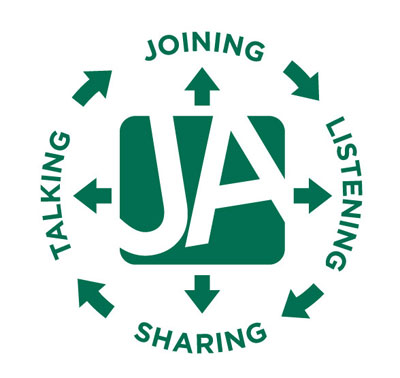 Goals going in:
Goals going in:
- Convene different communities of practice with a shared stake in the present and future of local TV news.
- Activate participation and instigate discussion to parse out different perspectives around significant opportunities or issues to gain more context around what’s at stake.
- Connect knowledgeable people who typically work within their existing network or may hold opposing views, with expertise compared in a shared stream of conversation.
- Bring the right amount of facilitation to flesh out subtleties and reflect ideas contributed in the forum back to participants for reaction, yet allow participants to share their combined insight directly.
- Report out across twitter while the forum was underway, both to engage active participation and to inspire active listening (or sharing) for people who wanted to follow the unfolding conversation.
- Go beyond just reporting to ignite a conversation across social channels, particularly through twitter, to create a “cross channel halo effect” where the JA brand takes on a life of its own.
- Test the JA forum tool set to learn what the participating community likes, and what might be improved to “iterate and optimize” the conversation experience.
One of the JA’s project objectives is to try new techniques or experiments that online community publishers or new media news innovators may be able to apply as “mulch.” Mulch, as the JA refers to it, is the byproduct of trial and error where we learn together and identify elements that can be tilled back into the work, or experiments, of others.
Objectives for this forum included tangible goods, such as:
- Offering new context and content to brief the community before the live conversation got underway. Creating background information on the forum topic to share different perspectives in advance of the live conversation, outlining the stakes and introducing some of the stakeholders.
- Discovering new ideas, information and resources; identifying opportunities for innovation in areas of confluence among what you might think of as“bio-regions” (internet, broadcast, print, radio, policy, public good, etc.) across the news ecosystem.
- Production of a tangible resource in the form of an engaged and informed conversation thread that remains useful, and open, after the initial discussion is over.
- Development of a series of informative reports on the JA blog to share with the community the “why, how, and what” we learned that might further future experimentation, conversation or collaboration.
- Extraction of new resources that can be mulched back in as listings on the JA for others to find, reference, check out or use.
Why local TV news?
In the landscape of local news now, TV is holding, and in some cases gaining ground among news customers, particularly as newspapers decline. Local TV news is hiring. TV websites sometimes dominate as the main source for local news. Surveys still find that around 70% of Americans get local news from local TV. And TV is going mobile – an opportunity for an even wider impact.
Vetting our assumptions
Is there a demand for cross-industry conversation around the future of local TV news? Participants in this forum had very specific reasons to join. For example:
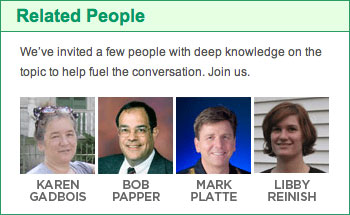 Libby Reinish, an advocate with Free Press told us that “broadcasters have made a bargain with public – and it’s really important to envision what [that] could look like, and what value it could provide to community.”
Libby Reinish, an advocate with Free Press told us that “broadcasters have made a bargain with public – and it’s really important to envision what [that] could look like, and what value it could provide to community.”- Mark Platte, a career newspaper journalist now leading the three TV newsrooms of Hawaii News Now, cited “the immediacy of news, the live aspect of news, being on the scene, being able to livestream” as important community services – and the “beauty” of TV news.
- Bob Papper, who annually assesses the state of the broadcast industry brought in public TV, wrote in the forum: “Frankly, I’ve never understood why people aren’t up in arms about non-commercial TV being such a non-player in local news.”
- Karen Gadbois of the investigative website The Lens New Orleans, an independent news organization housed in a TV newsrooms, said “it goes without saying [the TV connection] expands our reach.”
We sought a breadth of perspective as we began to map the conversation, organizing information in a spreadsheet we think of as the “issue grid.” For each forum we block the range of perspectives that may help inform a particular information void, or address a question where we seek out practitioners with unique experience. Libby, Mark, Bob and Karen kept coming up in our research. With these four participants generously willing to delve into the question, and deeply knowledgeable around key parts of the topic, we asked them to help us kick off essentially a live chat, during a specific two hour window.
Key themes
The question for this forum was devised to be deliberately broad, both to glean issues and opportunities relevant across the TV news industry and to give room for smart people with different points of view to acknowledge shared interests. At first, the discussion focused on news station consolidation. There were sharply conflicted views, tempered by other, more nuanced voices, on how these trends are affecting the public good. Later conversation touched on many topics, including:
- Imitable innovation, including collaboration between local TV and hyperlocal investigative sites.
- Reasons for a lack of innovation some places.
- Recruitment of new journalists.
- Broadcast staff turnover and layoffs.
- The new cost metrics for TV.
- The “untapped potential” or “marginal” role of public TV in local news.
- The impact of TV news on community engagement.
- Newsroom and station ownership diversity.
- Pay-to-play advertising.
- Public interest obligations and practices, including new trends in transparency.
- Public advocacy around broadcast policy.
- Discussion of innovative financial models for local TV news.
Performance
Quantitatively:
- The forum produced metrics that would make any startup happy: We exceeded our goals for comments, Twitter followers, retweets and other cross-network sharing, page views, and more. Of particular note, the average time on the forum page was more than five minutes. And 73% of visitors clicked on other site pages after visiting the forum.
- The facilitator (JA editorial director Emily Harris) posted 31 times on the thread. Her comments including at least 2 welcoming, 1 wrap up, 7 summarizing connections among various threads, 6 introducing new content, 3 clarifying facts, 4 posing general questions to the forum and 17 asking specific questions directed to named participants. Of those, 11 direct questions and 1 general question were answered.
- Participants introduced new ideas or stated perspectives in 26 comments; posed direct questions to each other 16 times, and posed general questions 11 times. Participants responded to statements 27 times, answered 12 direct questions from another participant, and responded to 6 general questions.
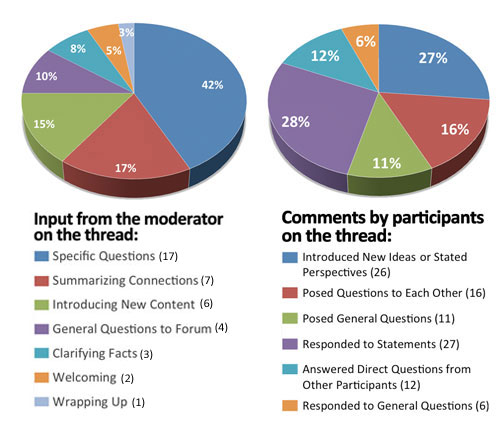
Qualitatively:
- The numbers reveal people wanted to talk about this – they just needed an invitation.
- Across the spectrum of knowledge, all participants were highly informed, had valuable experience to share and expressed a stake in the future impact of local TV news.
- While participants shared a common interest in high-quality local TV news, there were different views on the impact of station consolidation, the value local stations place on news, the options for different financial models, and the efforts of public television.
- Participants responded to each other using each other’s names. Direct questions had a higher response rate – promoting more conversation – than general ones. Statements sharing views or experience also had a high response rate.
- The forum thread is a snapshot of this moment in this industry, revealing both some top concerns and creative ideas.
- Timely events showed the forum can be an excellent place to share and respond to significant industry news, and to generate newsworthy comments around it.
- Some participants experienced specific technical difficulties early on in the forum, which were quickly addressed.
- The most common refinement of the conversation experience the community desires is a better way to follow a multi-dimensional conversation online.
Lessons learned
There is a trove of experience, energy, caring, and imagination to harness around this issue. Participant feedback reveals a feeling that the discussion was lively and fulfilling, although several said it was too scattershot. Many also felt the technology – a live thread with email updates – didn’t support a multi-track, fast-paced conversation well. We had a few technological glitches at the start – turning off spam filters solved an initial issue allowing for a larger volume of comments to be posted concurrently.
Overall, we walked away with a deep sense that people creating and consuming local television news are, like so much of journalism, both mired in the past and far off in the future.
New models of practice are taking hold, federal policy continues to influence broadcast television, and TV stations are growing their role as part of local communities with increased traffic on the web. Certainly it’s clear there is a large community committed to television news, experimenting, ready to learn and do more. We are eager to continue experimenting with the online chemistry of conversation to tap into the energy across a range of journalistic ventures. We welcome your comments and ideas to guide its continued evolution.




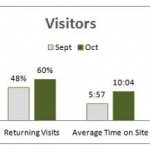

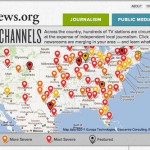








Weigh In: Remember to refresh often to see latest comments!
0 comments so far.